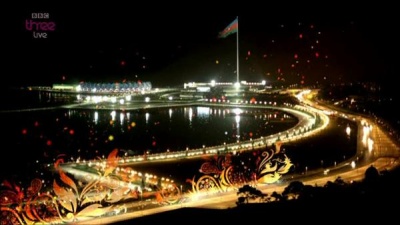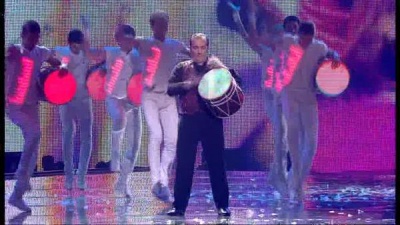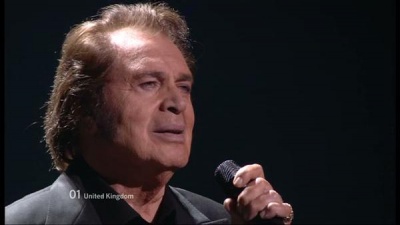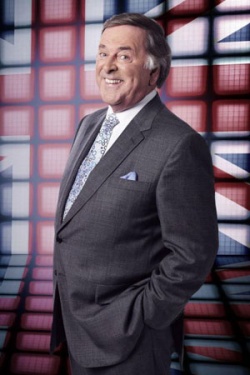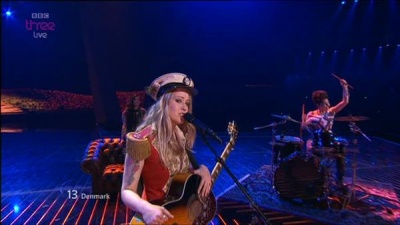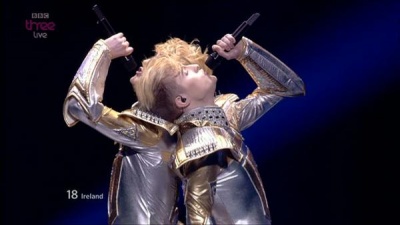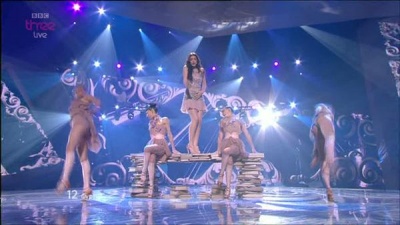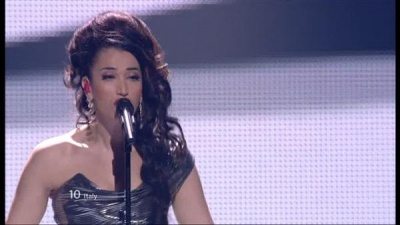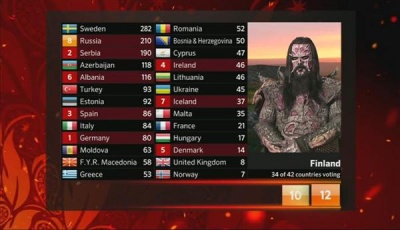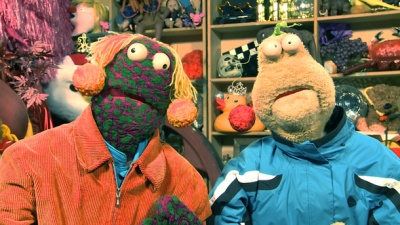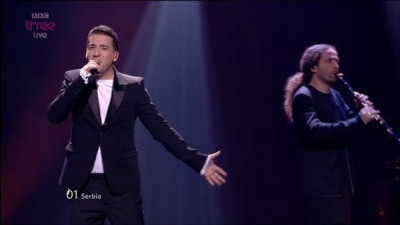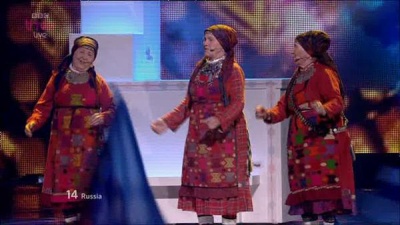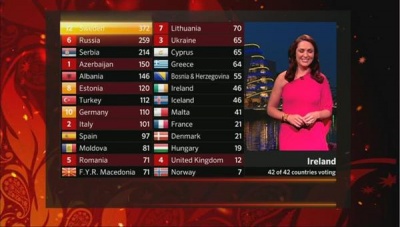Weaver's Week 2012-06-03
Last week | Weaver's Week Index | Next week
Isn't Loreen a type of low-fat butter?
Contents |
Eurovision Song Contest
Final, 26 May
As ever, a quick note about the semi-final voting. Russia pipped Albania to victory on Tuesday, with Hungary just taking the final slot from Switzerland and Finland. Under a single transferable vote to elect ten winners, these placings would have been reversed, and Finland would have made the final replacing Hungary.
Thursday was a win for Sweden, two juries clear of Serbia. Norway and Bulgaria tied for 10th spot, both countries had 45 points from 9 juries, with a top score of 10. Norway got through because their second-top score was 8, compared to Bulgaria's 6. Under the single transferable vote, neither of these entries progresses, and Macedonia and Ukraine also miss out. Going in their stead are Croatia (12th place), Georgia (14th), and Belarus (16th), all of which were a national favourite.
Readers may wish to buy the digital bundle or the CD, and all of these links help to support UKGameshows servers.
The contest
Well, the warm-ups are done. Englebert Humperdinck is going through his vocal exercises. Jedward have decided whether to wear their hair up or down. The Russians have been preparing a fresh tray of baking from breadcrumbs and butterbeans. And the Azeri police spent their Friday night beating up protesters for daring to challenge the regime there. The pressure group Index on Censorship reckons this is a bit rum, and has set up a petition to protest.
The BBC coverage begins with a crash fade into the EBU logo, chopping off the opening half-bar of "Te deum". Would it be beyond the producers' wit to put up ten seconds of zooming blue-and-yellow bits before the formal ident? And don't get us started on the BBC's decision to chop the reprise part-way through just because there are some commercial logos in the credits: the reprise is an integral part of the programme, and omitting it is like cutting away from The Voice just as Holly's about to announce the winner.
But that disappointment is 3 hours and 25 minutes in the future. The show begins with a six-minute routine featuring light-up drums, blokes wearing ultra-violet lining, and a singer who descends from the ceiling on a wire. Then we're treated to an edit of last year's winning song, and then comes a time-lapse film of the construction of The Crystal Hall. It begins with the site already cleared, and doesn't show the clearance of people from the site.
As is traditional, we'll take the entries in approximately ascending order. The automated STV algorithm we're using allows us to rank the entries by their popularity, and it comes out almost the same as the scoreboard. And if anyone actually cares that our STV algorithm of choice is the entirely non-deterministic Meek implementation of the dynamically-updated Droop quota with a fractional transfer of votes, we'll be worried.
The Battle at the Bottom
The Battle at the Bottom featured some regular contenders – Norway and Hungary had qualified because of the EBU's preferred voting system, and the UK clings to the base of the scoreboard like a limpet to a ship's hull. In the event, Norway managed to be less popular than anyone else, the most interesting thing about their routine was playing Spot the Singer. Hungary finished two off the bottom, with a song we'd forgotten after ten minutes, let alone when the Active Voting Window opened.
And in between came the United Kingdom's entry. The top and bottom is that this was a competent song, competently sung. Nothing more. If that performance had been on The Voice, Englebert would still be looking at the back of four chairs. According to reports, the jury final on Friday saw a competent song badly sung, to the point where he might have been buzzed off Britain's Got Talent.
The annual hand-wringing was led by Peter Soulsby, the city mayor of Leicester, who issued a press release fulminating against the Eurovision Song Contest. Doesn't he have better things to do with his office? He blamed "political voting" and claimed that Englebert had "performed brilliantly". So only two basic errors, there.
What is the BBC to do? Pulling out is not an option: if the Beeb didn't bother to send an entry, it could fund approximately *one* extra episode of Casualty. Great news for five up-and-coming actors chasing bit parts, bad news for the four million people who watched BBC1 this week and not last.
No, from where we're sitting, the problem is that the BBC still thinks the Eurovision Song Contest is exclusively a Radio 2 event. The commentators come from Radio 2, the songs are nothing that would offend the light programme's audience, and carry the sense of "We don't rate this song, but Johnny Foreigner might". Goodness, Ken Bruce said "you'd be amazed how popular Englebert is in eastern Europe." Actually, Ken, you'd be amazed how popular he isn't.
In previous years, this column suggested sending acts who don't need Eurovision to have a career. This has proven to be an error – neither Blue nor Englebert were able to perform well for two nights in a row. Also an error is the BBC's decision as to what song to submit – not since 2008 has the British Public had a choice of songs, and not since 2003 has the British Public based its decision on the song rather than the singer. We also note that the BBC3 semi-finals are doing rather well – 800,000 is the unofficial figure for last week – and that Sara and Scott treat Eurovision with both irreverance and respect at the right times.
So, our cunning plan is this. Open up the song contest to the public. Let bands and singers enter their songs during September, then have a panel drawn from Radio 1 and BBC3 people to weed them down. Have 24 (or so) entries chosen for play on Radio 1, and to be judged in heats on BBC3 in mid-January. No backstories, no introductory videos, just eight songs a night, performed back-to-back. One minute to set the stage, televote, result, it can all be done in an hour. The top half-dozen from those heats progress to the Radio 2 playlist, and a gala final on BBC1 in early February. If big names like The Saturdays or Adele (realistically: Steps or Deniece Pearson) want to enter, fine, but on the understanding that they pass through the heats.
This process ensures that the BBC's entry is selected by the mass audience, from a list approved by the younger people. It's also a piece of cross-promotion between radio networks, something that is far too rare at BBC Towers.
Relegation form
The UK entry has excited us to comment: the Danish entry has excited us to go off and find some more. We're clearly in a minority, as it was 23rd place for Soluna Samay. She looked like an out-take from the Sgt. Pepper album, sung a bit like Kelly Clarkson, and had a band that 1) needed a sofa to perform b) came from all over the planet, and III) featured the world's smiliest drummer.
France came 22nd, and we honestly couldn't remember a thing about Angunn's song "Echo (You and I)" by the recaps. We could remember the performance, the one with the male gymnasts. Style over substance, and possibly a bit pitchy. Malta came in position 21, about as good as they could ever expect from this twenty-year-out-of-style track. Ken Bruce expected it to turn into "Flying the flag", Scooch's UK entry from 1968.
Two countries tied for position 19. Iceland presented a towering ice sculpture of a song, cold and relentless. Shay Byrne reckoned it has a home in a Disney movie, at the moment when the hero believes all hope is lost but finds he's wrong. Hey, it's a Disney movie, it's cliché.
Ireland's backing singers included You're a Star winner Leanne Moore; the talent show began life to find a Eurovision performer and their song, and we think all the champs have now appeared on some Eurostage or other. The Jedwards performed in their own inimitable style, but this time Europe didn't take the hint, even though "Waterline" was the song we were humming on Friday. At least we're spared the prospect of next year's show coming from a barn in County Cork, with the Jedwards hosting it. "Oh mon dieu, failté Europe, je suis John, et mijn naam is Edward, og wilkommen back a Millstreet."
We'll pause for a word from the Libraries unit at South Dublin County Council.
- Go Jedward!!!!! Learned it all at Lucan Library you know :-)
Mid-table
There's a very long mid-table section, beginning with Bosnia and Herzegovina, which played very well in the Balkans, and did approximately nothing anywhere else. Greece finished 17th, which if anything was a little on the generous side for an unimaginative performance of an unimaginative song. It's the lowest 12-pointer, picking up top marks from Albania. And Cyprus.
Cyprus themselves finished in a tie for 15th. The entertaining performance from midweek didn't gain from repetition, though it did gain top marks from Sweden. And Greece. Ukraine's somewhat sampled trumpets and crowd-friendly presentation of a repetitive song picked up a lot of dribs and drabs; 10 from Belarus was the best, and they tied for 15th. Lithuania came 14th. "Love is blind" was the song, and maybe the Georgian voters were, they gave it top marks. Four from Latvia is unusually low.
Tying for 12th on the jury votes – but as high as 8th on the STV election – was Macedonia (Former Yugoslav Republic of). Top marks from Bosnia and Serbia disguised how the performance scored just 1 mark from outside the Balkans and south-western USSR – and that point came from Italy. Also in 12th was Romania, a slightly poor result for an entertaining song performed well. Not quite memorable enough from the middle of the show, when even this column was beginning to think "crikey, how much more of this?" and "when's the pizza ready?" Top marks from Moldova, naturally; 10 from Spain, thanks to the language.
Moldova themselves finished 11th, and didn't benefit from being drawn last. It's a great advantage in the semi-finals, where it seems Europe don't start watching until song 6; it's a disaster in the final, where two hours of this kind of thing is a bit much. Full marks from Romania, to no-one's surprise.
Qualifying for Europe
The official result then has quite a gap to the next song, Spain came 10th, with Pastora Soler performing "Quédate conmigo (Stay with me)". It's their best result in donkey's years, it's one that the fans are happy about. We'll be honest, we found it all a bit predictable and over-wrought, we reserve the right to be wrong about anything. Full marks from Portugal.
The biggest divergence between STV and jury voting came with Italy – 9th on the formal list, 18th on our unofficial tally. Nina Zilli was clearly auditioning for the Eurovision Amy Winehouse Tribute Concert later in the year, perfoming "L'amore è femmina" and going on about independent women. It seemed to be a compromise candidate in many countries – 10 from Malta, then nothing more than 7s, but Italy got some marks from 25 countries. Only the top three received more votes, and that suite of low marks explains the poor STV performance, where 12s and 10s are currency.
Germany won the battle of the Big Five, sending Roman Lob into 8th place with his American soft-rock song "Standing still", as written by Jamie Cullum. Not a tremendous song, well performed, and his looks will have helped. The distribution of votes – 5 lots of 10 marks – suggests a televoting favourite.
We'll pause for a review of the interval act (a bit like the opening act), and the interval act on Radio 2 (an attempt to conduct an interview via carphone with Englebert, which failed miserably. So did the interview.)
The show's seven-minute overrun came from the spokespeople. 60 seconds per spokey was always an ambitious target, and even such competent people as Scott Mills went a few seconds over. There was no shutting up the San Marino announcer, and Finland's Mr. Lordi delivered zillions of adjectives in his slow drawl. Ireland suffered from a problem, preventing them from giving their results three-quarters of the way through. Officially, it's a shaky satellite link, and certainly the pictures of Graine Seoige did break up a bit. We reckon it was a rearguard action, the studio getting invaded by forces loyal to Dustin the Turkey.
Which brings us to the performance in seventh place, from Turkey. The one where the backing dancers formed a boat. The radio commentators were on top form with their descriptions. "If you like this sort of thing, it's the sort of thing you'll like," said Ken Bruce, helpfully. "This baffles me" reported Zybszek for RTE. It's very simple: a traditional Turkish sound given a slightly contemporary drumbeat, and some very memorable staging. Top marks from Azerbaijan will have surprised no-one: the Azeris never miss a chance to give 12 to Turkey. It's as predictable as Greece and Cyprus.
Position six for Estonia: a strong song, well presented, and well executed. Not perfectly executed, we still think the climax at the first chorus is misplaced, but all well done. No twelves, but four sets of ten points.
It was very close for fifth and fourth places. Albania had a performance of remarkable vocal quality, and is the clear winner of the Eurovision Screeching Contest, and would probably win the Eurovision Björk Impression Contest. We're somewhat less convinced of its merits as a song. Expat communities in Macedonia, Italy, San Marino, and Switzerland gave the top marks.
Winning the nip-and-tuck battle was Azerbaijan: Sabina Babayeva performed "When The Music Dies". What is it about defending champions and songs giving the impression that they don't want to host next year? "Leave me alone" from a few years back, some unintelligable stuff when we were in Russia, and who can remember "Rock 'n' roll kids", when Ireland took the mickey out of their own contest. Anyway, the Azeri entry was somewhere in the vicinity of soft opera, good enough to hold its own, not quite enough to win. Lithuania, Malta, Turkey, and Ukraine sent the douzes.
Top Three
Third on the scoreboard – but second in STV rankings – was Serbia. Bulgaria, Montenegro, Croatia, and Slovenia sent the maxima, eight other countries sent 10, and there's evidence that Zeljko Joksimovic is a star right across Europe – six of those 10-points came from western Europe, including such Slavic countries as Norway and Sweden. The song was exactly what we've come to expect a Balkan song to be, emotive and powerful and in minor keys.
The gimmick came second. Russia's dancing grannies picked up something from every country except Switzerland, but only scored the one 12-pointer, that from very close ally Belarus. We said last week that it was a one-joke performance, and repetition has only re-inforced our opinion.
There are eighteen top votes left, and they all went to Sweden. "Euphoria" by Loreen was an instantly commercial dance-floor smash, and we have a suspicion that it's going to be the inescapable song of the summer. Because what's better to mark a sunny successful summer than a major-key up-tempo number that proved 31 times more popular than the UK's own entry?
Last week, we weren't convinced that this was the best entry in twenty years, since Brother Beyond. We're still not sure it's as good as "Fairytale", "Keine grenzen", "Love shine a light", or "Riverdance". We are certain that we'll have to be a bit more careful about re-using lines from Britain's Got the Pop Factor, as Loreen very nearly suffered the same fate as Geraldine McQueen after breathing in a piece of her stage snow.
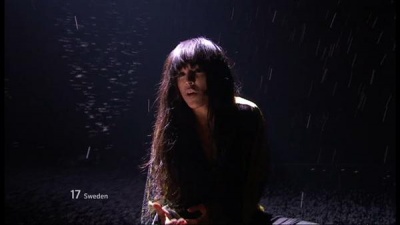 Dr. Fox was not in the house. Let us be thankful.
Dr. Fox was not in the house. Let us be thankful.
We still have an interest in the songs bought after the event: the data available to us is from one large retailer, active in much of western Europe but not the east. Sweden would still have won – indeed, Loreen's song is already number one in Ireland. Cyprus came second in most countries, pushing Russia into third, just ahead of Germany. The biggest gainer seemed to be Denmark, finishing about sixth in most countries, compared to approximately nowhere in the televote. Soluna appealed more to the teenagers than to the voters.
And the annual Eurovision Voting Map shows that the UK and Ireland are still neighbours. Ireland is also a neighbour of Denmark, and now exchanges lots of points with Latvia. France is still next door to Armenia – at least in points-exchange terms – but Belarus and Russia have split up, probably because Belarus has sent so many rubbish songs that never get into the final. Russia's also fallen out with Georgia. Turkey is giving significant points to the Netherlands, and Albania is engaging in a point-swap exercise with San Marino.
Europe's main axis remains an arc through the southern Balkans and into the former Soviet Union: from Bosnia and Herzegovina, through Macedonia, Turkey, Azerbaijan, and Ukraine. All of these countries are involved in five or more regular vote-exchange programmes, and all were called upon to vote early in this year's sequence – we could already see that the win was likely to come from the other end of the graph.
The final word goes to Anke Engelke, the German voting spokesperson. After thanking her hosts in Baku she said, "Tonight nobody could vote for their own country but it is good to be able to vote and it is good to have a choice. Good luck on your journey Azerbaijan, Europe is watching you."
This Week And Next
The BAFTA Television Awards were dished out last Sunday night. The Great British Bake Off continued to pick up prizes like a child in a cake store, taking home the Best Feature honour. The Young Apprentice was crowned in the Best Reality and Constructed Television field, and Celebrity Juice snaffled the Audience Award. A BAFTA Fellowship was bestowed on Rolf Harris.
What is John de Mol going to do about The Voice UK's problems? Stage a children's version, which is surely going to be Comic Relief Does The Voice, hosted by Sam and Mark, with David and Carrie Grant on a revolving sofa. According to A Demi Osbreevr, Mr. de Mol intimated that the live shows were indistinguishable from other talent shows.
He also said that splitting the results to Sunday nights had taken away the tension. That's "taken away" in the sense of "we could have given away all the results from spoilers, if we'd chosen to do so". And in the sense of "seriously, we stand our analogy of a balloon that popped during last night's party and is now a slightly damp rag in an awkward place behind the sofa."
Here's worrying news from BARB towers: the biggest game show in the week to 20 May was The Apprentice. Alan Sugar brought 7.15m viewers to their telly, compared to 6.8m for The Voice of Holland UK. HIGNFY scored 5.9m viewers, and In It to Win It celebrated its tenth birthday with 4.4m viewers. ITV's biggest game show was Millionaire, which attracted π million viewers; The Chase had 2.45m, just behind The Apprentice You're Fired on 2.6m. Channel 4 did deign to produce figures this week, but they needn't have bothered – 1.45m for Celebrity Deal or No Deal is as good as it got.
A League of Their Own was biggest on the digital channels, 870,000 saw whoever it was on doing whatever it is they get up to. It's a show we don't get in at least two senses. Come Dine With Me brought 665,000 to More4, and highlights of Britain's Got Talent attracted 580,000 to ITV2. All New Blockbusters opened with 290,000 on Challenge, which is only just behind CBBC's repeats of Total Wipeout, on Saturday at 8am.
Last in the present series of The Apprentice (BBC1, 8.30 Sunday), and it's finals week of Great British Menu (BBC2, 7pm weekdays). Big Brother returns (C5, from Tuesday). Here's a sentence we never thought we'd write: next Saturday's highlight is the 8 Out of 10 Cats jubilee special (C4, 9.40).
Links marked with a * help support the UKGameshows servers.
To have Weaver's Week emailed to you on publication day, receive our exclusive TV roundup of the game shows in the week ahead, and chat to other ukgameshows.com readers, sign up to our Yahoo! Group.

